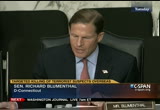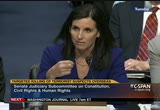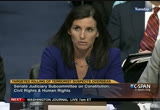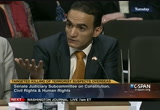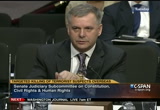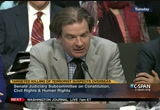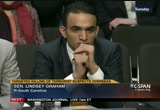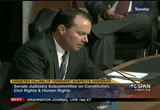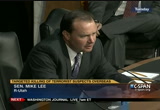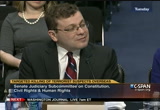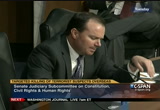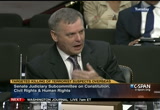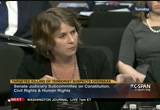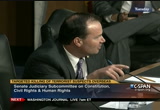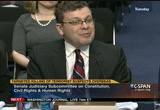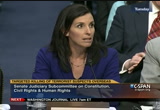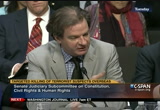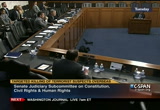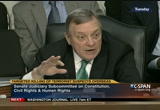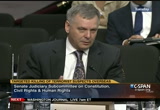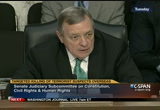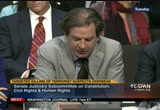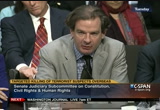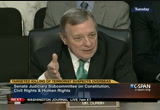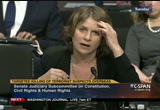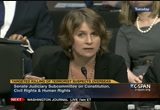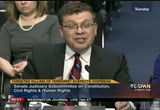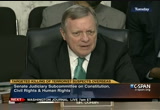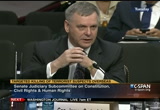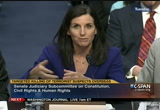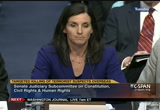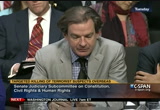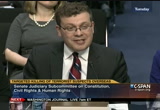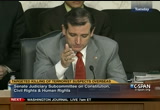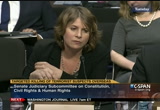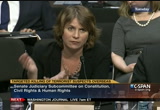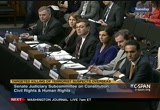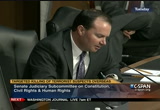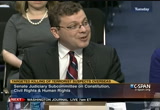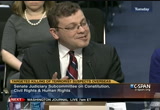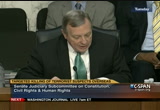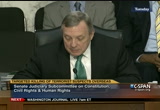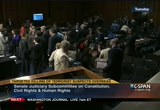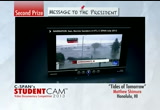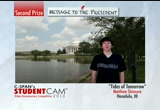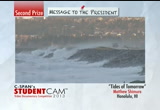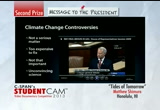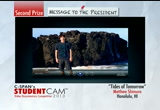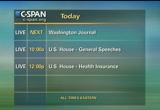tv Capitol Hill Hearings CSPAN April 24, 2013 6:00am-7:00am EDT
6:00 am
because the witness raises the issue, and i think it is a very legitimate issue, that somehow there needs to be the perception of greater damage and possible mistakes associated with this kind of weaponry, this tool >> i cannot speak said specifically, senator, about the situation in his country, but i can make sure that we minimize civilian casualties. the process that i have been through and i am familiar with is one where we have to meet a very high level of positive identification once a target has been approved as a target, that we have actually met the criteria, positive id, we met the criteria of geographic location with a variety of different sources with high confidence, and that we have
6:01 am
done a very thorough collateral damage assessment, which is a very detailed process that we go through. i would encourage you all to get declassified briefing briefing on that process and how we do that. to make sure that we do not have unintended civilian casualties. so we do have the process available. in the case that you have been sharing about the impact of some of the strikes going on in his country, i think we do need to take a look at the scrutiny of and then that list making sure that the operators have the appropriate bar of positive identification and geographic location and the collateral damage assessment. but we do have the capability. the testimony shows we need to ensure that that is very high because the unintended consequences are severe. >> my time is experience -- is expired, but if mr. -- 70 comments -- >> of course. >> thank you.
6:02 am
a lot of the mistakes that have happened is because i do not know if he is a target or not. that is why he is welcome everywhere he goes. and that has made a lot of mistakes that have happened and a lot of killings have happened the but because people do not know that this person is a target. and not just that he was tried to be arrested. another issue has blowback of making people fear the u.s. ,hen he says that in the past people tell their children go to sleep or i will call your father. now they say, go to sleep or i will call the planes. that have shifted the whole conversation. in addition, it is not just the blowback of this, but more potentially it is the killings,
6:03 am
we which is making it look like americans -- they have got more to more than you imagine. >> thank you. whatw quite, i worry here we have seen with drones is that without the targeting on the ground, precise information and intelligence that is verifiable, that that is generally when we have errors. so we need to look at that end of the process, and whatever process would put together, we need to ensure that the intelligence that drives the targeting is also part of the scrutiny. if we miss that, then we will rely just on the drone, we have challenges. >> thank you. >> senator graham. >> thank you, mr. chairman. i would like to say for the record that no system is perfect, but generally speaking,
6:04 am
i want to apply the obama administration. i think i'm aggressive and responsible part of the drone program, particularly where we do not have a lot of control, makes the rest of us safe. i do not get to say many good things about president obama in south carolina, but i will say that i think he is serious. i think he is thoughtful, and i think he takes the responsibility when it comes to targeting people in a very commander in chief-like way. car right, right, -- as a marine, when you are ordered into battle, do you obey his orders? >> i do. >> i find it a bit odd that we are going to give the commander to orderthe authority our own citizens into battle but
6:05 am
they don't get to go to court. , i marines don't get to say think that is a dumb decision, i want to get a judge to say hey, you should not go. my belief is that there is nothing more basic to being commander in chief then being able to order people into battle and being able to assist -- to suppress the enemies of this nation. if you want to talk about transparency, county and. i'm talking about having congress more involved. if you contemplate conferring the power from the commander in chief to a bunch of unelected judges to make wartime decisions, count me out. that would be a breathtaking overstepping. and unfair to the courts because if there is a situation where they get a case and they say we do not think you are quite there, and that person
6:06 am
wind up killing a bunch of americans, there would be outrage in this country like you have never seen, and the court cannot defend itself. of the united states would have to answer to the people about any mistakes he makes. so count me in for reforming the system, count me out from basically turning the war into a crime. the doctrine of reaction -- do you think that is a solid doctrine in the war on terror? a question of imminence, sir. >> the theory being that basically when it comes to al qaeda and the taliban, it is better to hit them before they hit you. >> if you look at the victims of this strikes, overwhelmingly they are lower members of the taliban. so do they pose an imminent threat? >> let's talk about that. general car right -- cartwright
6:07 am
, do you have to wake them up before you shoot them? >> no. >> why? >> he is a legitimate military target. >> that is the point. once you are designated an enemy, we do not have to make it a fair fight. we do not have to wake you up. we're going to show you. and that is the point. here is the problem -- how do we know if you are the enemy? that is a legitimate inquiry here. what i am suggesting is that we back off and look and see the goal we are trying to accomplish. what is your name again, sir? >> -- >> i've been to yemen. it is a country great turmoil. do you agree with that? >> they definitely have a lot of problems. >> i understand that.
6:08 am
mr.bergen, would you advise obama to call the pakistani government to go arrest bin laden? rejected. >> could you imagine what happened if they came out in the public that we told the pakistani government, bin laden is over here, go get him, and he got away? my party would've eaten president obama alive. the reason president obama did not do that is you can't trust the pakistani government to go pick up bin laden. in all due difference to your country, there are places in your country i would not tell anybody about what we were up to because i think the person that we are trying to capture or kill would wind up knowing about it. -- why do we arrest the guy in the village? nothing would leave me more to be able to arrest somebody to
6:09 am
interrogate them, but the world in which we live in is if you share this closely held information, coronal make sally , -- you are going to wind up tipping off. i want to put people president obama's shoes for a moment. what do you share and who do you share it with, and who do you pull the trigger on and who do you give a pass? all i can say is that he above all others and the next person to occupy that office needs to have a reasonable amount of deference, but not unchecked powers. we have one commander in chief. we cannot have 535 commander in chief's. so mr. chairman, i'm glad we're having this debate, but when it comes to the law of war, is it fundamentally different than domestic, criminal law you go -- law?
6:10 am
>> yes, it is. >> the purpose of the law of war is to win the war. it is to neutralize the enemy to gather intelligence. the perfect of a messy criminal law is to solve a crime -- the purpose of domestic criminal punish.o do you agree with that. >> absolutely. >> the goal here is to make sure that we know the difference between fighting a war and fighting a crime. here's the problem for the capital-- there is no to conquer, no navy to sing. we are fighting an ideology that is transforming itself all over the globe. we need to look at the place and new. we need to broaden the ability to go after the enemy because it is changing day today. but we need to do so within the
6:11 am
value of being an american. please don't mistake my zeal for defending the country -- it was senator mccain and myself and many others who said do not torture the detainees. when you capture someone, we don't cut off their heads, we give them a lawyer. that makes us better. not weaker. so count me in for the idea of fighting the war within our values. the reason i don't want to torture anyone is because that is not who we are about and it hurts us more than it helps us during -- helps us. having said that, i understand the difference between fighting a war and fighting a crime. and i will work with my colleagues in anyway possible to make sure that we make the least amount of mistakes as a nation. the one mistake i will not tolerate is the mistake of believing we are not at war. >> thank you, mr. chairman.
6:12 am
thank you to all of you for joining us. i would like to start with professor selman. in your testimony, you note that critics of the administration's white paper on this issue focus on the weaknesses of the pre- requirements outlined in that white paper. under the memos analysis you must be met before u.s. citizen may be lawfully targeted in a drone strike. you argue that because those requirements apply only when the a senior operated leader of al qaeda or some associated force, the memos weaknesses might be mitigated, or some have argued this. you state that a senior al qaeda leader likely qualifies as a legitimate target, and even if he does not pose an imminent threat. you also notice the real
6:13 am
difficulty lies in determining whether somebody is or is not a terrorist leader. an interesting spot. our constitutional system to accords, i think, a degree of due process to a u.s. citizen before that u.s. citizen is deprived of liberty or property or most importantly life. do you tend to agree that it is essential that we have in place some kind of procedures to make sure that people are not deprived of life in this instance, absent some kind of procedure that can be used for determining whether or not somebody is a terrorist leader? , i do agree. that is the central issue i posed in my testaments and other witnesses have. summary of a terrorist leader
6:14 am
that is part of a group that is at war, they are a legitimate target, even if they are not an imminent threat, even if they are sleeping in their beds. at the same time, we do need some procedures and ways to ensure, particularly in the case of u.s. citizens, that we are choosing the right people. court as one mechanism that can be used, but there has to be in place procedures within the executive branch to try to minimize the risk of error in this respect. we cannot have as much procedure as we would have an ordinary law enforcement, but that does not mean the issue should be completely left up to the discretion of the president and his subordinates. next you have any indication as >> do you have any indication as to how they should go forward? usesthe determination that
6:15 am
due process? >> some witnesses may be more qualified than i am to speak to that question. is theficult issue administration has not made public a lot of its receipt is your so i joined a lot of people at this hearing no stated that more publicity on this is desirable, consistent with classified sources are dwindling a more, we will be in a better position to prep -- to assess whether this is adequate or not. >> i appreciate that. i want to ask a question that i will give each of you the opportunity to answer. given the time constraints, you have to be a little short. my question is this -- what do you think are the obstacles, the principal obstacles to providing for some kind of independent review, independent judicial review of the
6:16 am
executives determination that a u.s. citizen is a terrorist leader and therefore potentially the subject of a lethal drone strike? what we start with you, general? >> there are so many scenarios that you could wonder your mind through. are inllenge -- if you a declared area of hostility, which is the basis of the questions that senator graham was asking, then you have a set of rules, even associated with americans that might be in a population of targetable people people. it would be difficult to stop and have a court case for each of them. areau are outside of an of declared hostility, you have more leeway to have a discussion. i believe having a process on the backside, accountability process, that says we knew going in we had set up some
6:17 am
rules. they may not have worked all the time, we may have made errors here were errors made in this case? should the victims have been afforded more rights? should they be compensated for the loss? what should happen at this stage of the game? of the example, like the yemen examples we have heard today, rather than putting the court in the middle of a war construct, which i think would have some cause additional issues, i defer. >> thank you. professor? >> senator, i think there are no obstacles in some sense in creating a more fair and thatparent system, citizens are not wrongly targeted by the government. i think all of the reassurances we have heard about the use of remotely piloted aircraft to ensure that we are getting the people we target and not innocent civilians -- they are
6:18 am
only as good as our intelligence and as wide as our strategy. that said, i think the biggest political barrier that stands in the way of developing some better mechanism, judicial or otherwise, to ensure that we are targeting the right people based on a reliable process and fair process and fair rules, are that we tend to see this of a very black and white issue of there is war and there is crime and never the two meet and they are completely different legal systems with different roles are what we have here right now with globalized terrorism with al isda and other groups something that in many ways is like traditional armed conflict and in many ways is like large- scale, organized crime. that is the reality. it has dimensions of both. it requires military tools and tolls more traditionally associated with law enforcement, like communications. i think if we can get past that
6:19 am
-- right now, we have a lot of people talking right after each other. in it were, you could do this. if you don't have a war, you can do that. then the trouble is, we have difficulty deciding whether we should apply the war paradigm on the crime paradigm. >> you are not disputing that there are some bright lights that go on, domestic soil, u.s. citizens -- >> absolutely, senator. on the extremes, we have it easy issues. it is in the middle of the issues get harder and we need to get more creative about developing hybrid legal mechanism. >> mr. chairman, i committed a grave error which is asking a question that went well over. do you want me to resend that question for the rest of the panel? he is to suspend the death elsie and this circumstance. i appreciate that. conscious of these damages hanging over our heads, i would try to be brief. i think there are two obstacles
6:20 am
to ensuring a better system here. necessarilywe are relying on intelligence that in some cases would be iffy, secondly, the review mechanism must be independent and act reasonably swift, otherwise we might lose the opportunity to attack a legitimate conflicts. -- legitimate target. we have overcome them to a large extent. scholars propose ways to do this. the government of israel does have a review mechanism. so there targeted killings work reasonably well over the years. i'm not saying we could adopt ,he exact methods that they use but i think despite the difficulties, we can at least reduce the risk of error and increased the chance of limiting this to a legitimate target without losing the opportunity to attack genuine terrorists.
6:21 am
thank you. >> thank you, colonel. we need more transparency in the process that we're using to identify somebody as unapproved target. if additional oversight of come , i would encourage that it would be in the area of somebody being unapproved target but not approved being an target, but not in the strike. sometimes it is moments, hours, or even years before the stars light up it we meet all of the criteria, as it is in the right location with the right weapon. if that happens and it has to be on the front end, to disagree on a target list outside of an area --active combat operations >> let me define find that they are a terrorist leader. >> it is already painful enough to go up the chain of command to whatever level we have to in
6:22 am
the middle of somebody already having been approved, they are already on the list, and now you actually have to get additional approval for the strike. any times, you lose the opportunity because too much time goes by and the target is fleeting. any of that additional oversight needs to be on the front end and outside of our traditional combat areas. >> thank you. >> i think there would be an advantage in having a post fact no review of cia strikes. a concrete thing could come out of this. when the u.s. military kills civilians, we pay salacious payments for the victims' famil ies. you can imagine drone strikes were there was a civilian castle these. i you to make the same kind of tame it. after all, if it is a war, and innocents are killed, does not matter where those take waste. we have the country have tended to, say people. >> in the last years since the
6:23 am
strikes and target killing have -- theed in yemen, big terrorist group has been stronger. one of the things that has to be ane very fast is issue apology to the civilians and compensation for the civilians' relatives who were killed. there has to be a certain compensation to build a hospital or a school. >> thank you. thank you, senator. to the people at yemen know that we're there there with the approval of the government in yemen? it is very hard to speak whether people know or don't know, but whether the government approves or doesn't approve, it is outside the big fancy walls
6:24 am
of the capital, bringing a lot of blowback. it is not an issue whether the government approved it or not. it is not an issue -- it is as much as this on the ground. thans been a problem more help. >> before the drums, was aqab viewed as a positive force in human or a negative force? >> i've never met anyone who looks to aqab as a positive entity ever. >> we have a divided when it comes to draws between the caa and the military. -- when it comes to the drones between the cia and the military. can you give me your opinion as to whether this is a good thing, a necessary thing, or whether it should be continued? colonel mcsorley will
6:25 am
jump in on this great -- on this. whether it be drones or other types of weapon systems, when you ask the military to conduct operations that are not military we generally have trouble. to doin our people military operations. so if you ask them to patrol the border, people often times get killed that should not have been shot. so if we're going to have the military participate in these type of operations for an extended period of time, then we need to go back to some of the practices we probably had in the past associated with reconnaissance, where we have specific units designated and equipped and trained to do that kind of operation. if that is what we're going to do, that is what i would recommend. if you would like to have just one air force rather than two or three for the country for
6:26 am
logistics reasons, training reasons, etc., than any to be -- then it needs to be an air force capable of training a set of people for a specific type of mission that is not the same mission as an area of armed conflicts. >> what i'm driving at is i have been to one of our bases where the drones are launched, and i have seen the intelligence gathering taking place. according tone, the book, and that is what i was told, it is a very painstaking, elaborate, lengthy evaluation of sight, percent, before the ultimate decision is made. tragic the circumstances where innocent people have killed, every effort is made to avoid that. to the extreme, avid it should be, as americans would incensed -- would insist that it be. the basic question is whether or not intelligence capacity, which is so important in that
6:27 am
process, is different or better between the cia and the military. do you have an opinion you go -- opinion? >> if it is in a country where we have not declared hostilities, then it is generally accepted that the agency have better intelligence and better ability to gather intelligence than the military does. that is under the current rules about who does what where. >> thank you. mr. bergen, one of the things that you're america foundation has been involved in is some public opinion research about the impact of the drone strikes in pakistan and yemen. could you tell me what you found? >> we did on independent poll, we found overwhelming opposition to the drone strikes. -- ifask the question the pakistani military were involved, would your opposition
6:28 am
change? and the opposition goes on a lot. so it is an issue of national sovereignty. we also found overwhelming opposition to al qaeda and the taliban. we asked if either one were on the ballot, would you vote for them in an election, and the outcome was only one thing percent what. would. 1% there is nothing in yemen on a scale of what there is in pakistan. it is really more about the sovereignty issues than the civilian casualties issues. parliament and april voted to basically stop this. confusingve a situation where the parliament has voted against this yet is still proceeds. they have f-16s, which could theoretically should these runs down, but they don't. so there are some kind of tacit consent. >> that is exactly the point i want to go to. what i find different here is the definition of battlefield.
6:29 am
i knew what we were voting for in 2001 when it came to afghanistan. we were headed there. that is where al qaeda was. attacked the united states, and we were going to answer that attack. i did not realize, and i don't think many members did, that we would be having this conversation 12 years later about yemen, somalia, even pakistan. maybe i should have been able to discern that, but i did not. maybe someday. it appears now that we at least have to have passive if not active approval before we are using these aircraft, these , before aerial aircraft we engage the enemy. i take it the enemy is in a lot of other places, but we are not pursuing him. so how does this work into this definition of battlefield and the authorization of the use of military force? >> not very comfortably.
6:30 am
the deep problem is that we have got a few legal paradoxes i do not fit the challenges we are facing. to illustrate, you may remember chilean a former defense minister who had been ousted and imprisoned and tortured alternately came to the united states and was outspoken against the chilean military dictatorship. the chilean military decided in the context of the ongoing insurgency in chile that they did not like every much and so chilean intelligence put a car bomb in his car in d.c. our government call that murder at that time. my concern right now is that we have -- because of the gap between these two legal paradigms in the extreme secrecy and lack of transparency in which these decisions take place, right now,
6:31 am
if we can imagine that those circumstances occurred today, i would assume that the chilean military government would be saying to the united states, what is your objection? he is an enemy of the chilean state, you are unwilling or unable to do anything about it, we asked you, you harbored him, and so we had to take matters into our own hands. thatwould reasonably reply is our decision to make. and we don't have to tell you the basis on which we made it. my broad role of law concern is that we have essentially handed a playbook for abuse to oppressive governments around the world. so we need to develop some middle ground that it knowledges that we are in a situation that is warlike in many ways, but crime like in other ways. i think we can do that. i think that is is a question of creativity. , if i may,omment goes to the strategic issue.
6:32 am
when it comes to the strategic costs and benefits of this policy, unfortunately, perceptions matter as much is reality. so while i very much agree with my colleagues that drones do not prevent novel legal issues, the the blowback is real. and we are taking into account the strategic costs, that is something that we have to consider just as much at the legal issues. >> just briefly on this issue, the aumf does not contain a geographic imitation. rather, the limitation is based on the nation's organizations or persons that the president determines, authorize, that aided to terrorist attacks. so it is not loaded to afghanistan or a particular nation. it allows the president to attack these groups or individuals wherever they might be located. abbott said earlier, there is an important decision between nations whether the government
6:33 am
supports these groups or is unwilling or unable to do anything about them. i think both legally and from a policy perspective, different measures are appropriate, and i entirely second what others have said it and that there might be cases where it is legally or even morally appropriate to use lethal force. we might want -- we might not want to do so out of policy considerations during but theau aumf is such that it does not have a geographic constraint. when terms of hot pursuit it comes to a 12 year effort in far-flung places where our progeny al qaeda's would somehow appear. it is a little different time and place after 9/11. now we are looking back it from a different perspective. senator cruise? -- curuz?
6:34 am
.> thank you, mr. chairman for counterterrorism purposes, what is the relative value of killing versus capturing a senior operational leader of al qaeda, and how is that assessed? >> i have to sit in the hypothetical here, but there is a progression of a terrorist organization generally look that in three stages. one is recruiting, and you have an iconic figure. in a particular phase, a limiting that figure 11 is the movement. when you move into the second stage, that is where you start to build a bench, so just the. if you build one, another one will come. the third stage is franchising. they start to proliferate out and have their own ability to generate. after you leave the first stage , separate political
6:35 am
considerations, killing the leader has little value because he will be or she will be replaced. particularly capable one and it takes them a while to recover, but generally it is considered in the second and third stages -- killing the leaders is not really a laminate the movement. >> colonel? >> i will speak to the challenges if you do choose a capture over a kill mission. it really does depend on individual circumstances and the location, whether it is more desirable to kill or capture. let's just say we are agreeing maybe you want to capture and more circumstances, than it does depend on the country we are talking about in the location. it goes back to is their consent or are they unwilling and unable, or you going to take them off when you make that call? if we decide we need to make this capture mission, that make complex operation.
6:36 am
you're talking about about bringing in special forces. sometimes the intelligence pops notice.ent's you could have been waiting for weeks or months unable to do other missions waiting for intelligence. they may have to fight their way in and fight their way out. so there could be some extraordinary civilian casualties if things go wrong. reality that you then have a potential for u.s. casualties or u.s. individuals to then be captured, and the strategic implications of that. so there was are all the things that are weighed when you are considering, even if you desire to do a capture mission, sometimes the bar is way too high, and the risk is way too high, and the cost is way too high and time and opportunity cost. >> thank you. the obama, how has administration focused on oureted killings effected
6:37 am
ability to gather intelligence and analyze situations in the middle east, such as in libya or egypt? >> it is a hard question to answer. but it was hard to predict the egyptian revolution. even the people involved and not know it would be successful. the cia did seem to miss that a quarter of the seats were taken by the second-largest party in egypt. at the end of the day, the cia should be in the business of strategic warnings to policymakers. that is ultimately what should be doing. so if it is the assessment of you and your colleagues that the cia mission has been he formed by fact that we have become more of a paramilitary organization, i think that is a problem. >> thank you. -- a question for present professor solomon, do you see obamansion between the
6:38 am
administration's position that u.s. citizens who are captured aiding al qaeda must be tried in article three courts instead of military commissions, but nonetheless they can be similarly killed in drone strikes? >> i don't think it is inherently inconsistent and that when we capture somebody -- if we consider somebody and in -- , once theymbatant are captured, i think the m administration could choose as a matter of policy to try these individuals in article three courts as opposed to doing so in military court, so i do not think it would necessarily be unconstitutional or illegal to go the military court route. i guess there is not an inherent contradiction and left the administration says we're not only choosing as a matter of policy to try enemy
6:39 am
combatants in in article three court, but actually rhyming that it is never permissible to try such individuals in a military court, which i think would probably not be correct. >> would you agree that on any greater there is a potential violation of someone's rights to take their life than it is to capture and interrogate them? >> in many cases, i think that is true. but i don't think it is true categorically in that there could be a person who is a legitimate target, and therefore can be killed in a battlefield, but if captured, there are still legal limits on the methods we use. we should not be able to engage in torture, which is illegal under domestic international law. >> sure. let me ask a question, professor solomon and professor brooks, there have been been some considerable discussion about the potential role of the court dealing with either designating individuals as
6:40 am
terrorist leaders or having some role in drone strikes. it strikes me that senator graham raised serious constitutional questions about the article to row of the commander-in-chief and the appropriate validity of this congress to restrict the decisions of the commander-in- chief, directing military against foreign hostile forces. i would be interested in both of your assistance -- both of your assessments about the boundaries that would respect those constitutional inserts. >> i think everybody would agree that the president has important powers as commander in chief. at the same time, congress has the authority under article one to make rules for the government and regulation of the land and naval forces, which i think includes the president when he is acting in his role as commander-in-chief. congress does things like restrict the kind of weapons that can be used in the
6:41 am
battlefield. it restricts the treatment of prisoners when they are captured and so forth. therefore it is also permissible for congress to require a certain amount of process before a certain kind of operation is ordered. i think article one gives congress that authority just as a gives it the authority to make the other kinds of regulations that i suggested. the fact that congress has authority does not mean that congress should always exercise it to its fullest extent. various scholars and others have talked about how to strike the right allen's of independent review and how that should be done. >> senator, congress also has the ability to plan offenses against the laws of nations. i think that would be a useful mechanism in this regard. the only thing i would add is who guards the guardians. we all agree that if there were to be some future president who was, say, and same, and simply
6:42 am
insert -- asserted that there was a war against a perfectly innocent group of people and that justified the worth -- the use of lethal force, we would hope that there will be some kind of in page meant to restrain that use of i do not think the commander in chief power and the fact that the president obviously have a great deal of discretion when it comes to armed conflict, needs to necessarily restrain congress from all oversight. , think you can design a court particularly if you focus on the after the fact review, rather than the advance approval of targeting. i think you could certainly devise a judicial process that would not pose any of those problems. professor solomon mentioned earlier a man it is worth at the to take a look israeli supreme court's 2006 decision on targeted killings. it is a very similar legal
6:43 am
system in many ways. the challenges they face demand thickly with regard to terrorism are far greater than those that we face, luckily for us, but that cord resoundingly rejected the notice. the question of whether a particular body of law applies in the first place to a particular body of fact, that is the kind of decision that the judiciary is normally considered to be qualified to make. each ofld like to thank the six of you for a very illuminating and insightful test money. i would like to thank mr. -- for traveling a considerable distance, and i think the chairman for conducting this. quite steep why, senator lee? >> thank you. senator lee? oversighting an court, something modeled after the -- court, for neville, with
6:44 am
reviewingf risk -- of the executive's determination about a u.s. citizen being a terrorist leader, some naturally worry that such confidential courts operate without any amount of transparency, any kind of review, so much of what they would be completely immune from any oversight from the public, from any kind of scrutiny. at the same time, others would argue that it necessarily makes a certain degree of sense to do that where you are dealing with so sensitive a determination as whether or not a particular u.s. citizen is a terrorist leader. , if congressn is were to agree with the recommendation to create such a courts, a five a-like court, how would you recommend they go
6:45 am
about the delicate task of balancing the need for a degree of confidentiality, on the other hand, the need for the public to be able to understand what is happening on some level? is there a way that you couldn't separate those two out so you could make them both, and it's? -- both hominis? >> there are situations already in the legal system where national security information or evidence that may infringe on somebody's privacy is held in the camera by the court and is not publicized him of it at the same time, the courts legal revising -- legal reasoning can forublicized for resume -- review by higher courts and outside experts. it seems to me that while particular details of factual information or intelligence data, that can be held confidential, the courts legal
6:46 am
for rejecting such request can be made public. as professor brooks has noted, if we can reduce this tension, even if we cannot totally eliminated. >> he does that mean possibly bifurcating the proceedings or making some aspects of the determination public. >> yes, that is correct. we cannot have perfect transparency, but this is some we would at least have somewhat more transparency where the decisions are made almost entirely within the executive branch.
6:47 am
>> special thanks to this panel. and thank you, mr. dash, for your personal sacrifice. your testimony was extremely important for this meeting. thank you, mr. bergen, professor brooks, general cartwright, thank you very much. this was a long and is abated hearing and the first kind in the senate. i'm sure not the last. there will be more that will be discussed. a number of groups that submitted testimony that will be added to the record without objection, including the american civil liberties union project,onstitutional human rights first, human rights watch and the open societies watch. i want to take a point of personal privilege to acknowledge the person in the audience who is sitting in the
6:48 am
second row here. she is currently a deputy federal public defender in los angeles, but she returned for this hearing before the last two years, she she has been on detail to my office and served as counsel on this constitution subcommittee could before she left, she helped prepare today's hearing. i hope we did well based on your standards and what you have asked us to consider. she has made many important contributions to our work and included improving coordination by federal and state and local law-enforcement and apprehending international fugitives and planning the first of a congressional hearings on solitary confinement. thank you so much for your fine work. the record will be held up -- held open for week to accept statements. additional questions from what is it can be submitted. i asked that they be submitted one week from today. i would like the witnesses to respond in a prompt fashion. no further comment from the panel, i think the witnesses for
6:49 am
attending, and my colleagues for their participation am a the hearing fans adjourned. [indiscernible] [captions copyright national cable satellite corp. 2013] [captioning performed by national captioning institute] >> all i am doing is talking. >> sir, you are under arrest. >> why am i under arrest?
6:50 am
of honolulu,imura hawaii, the second prize winner. in a story, he asked the president to concentrate on the climate changing effect of rising sea levels. 2012 has beennt, a difficult year for the planet. >> look around at what is happening now. increase heat waves, more ,roughts, more sudden downpours more widespread wildfires, and worsening soil. extreme weather events are convincing many merit we've got the storm of this century every year now. >> more water enters the system. sea levels rose 3 feet. if that happens, orleans and miami and oakland could find themselves under water. in october 2012, hurricane sandy showed us the destructive power, and of an angry ocean.
6:51 am
much of the damage was caused by flooding and storm surge. as the sea level rises, such as storms will become even more destructive. mr. president, unless we address the problem of the sea level, we may find ourselves swept away by the tides of tomorrow. here in hawaii, the ocean is a central part of our culture and way of life. rising sea levels will affect how we live, work, and play. a 300 acre park in my neighborhood could be under water if the sea level rise happens as predicted. hawaii is vulnerable to coastal erosion and saltwater contamination of fresh water supplies. i realize rising sea levels are not just a problem for hawaii. last summer i travelled to the u.s. mainland to see how this is a problem for our whole country.
6:52 am
my first stop was san francisco, where i saw how the ocean is eating away at the foundation of the great highway along the coast. next we traveled to the california delta, covering over one of thousands or miles. the california delta is an expensive estuary where the sacramento and san joaquin rivers meet. the delicate includes some of the most productive land and provides water to 3/3 of the state's residents. the land has subsided so it's now below sea level. the land in the delta is protected by an elaborate system of levees that are vulnerable to overtopping and failure and require constant maintenance. california delta and the central valley region are among the bonet mobile. next, ballston,, the infrastructure and homes face
6:53 am
dangers from rising sea levels. much of the land is only a few feet above sea level. as the levels rise during this century, boston neighborhoods, highways, and waterfront areas will be flooded. new york city, i was surprised to learn how close the city is to the ocean. major business centers and residential areas are at sea level. the infrastructure like tunnels are actually below sea level. several months after our trip, hurricane sandy showed the world how vulnerable this region is. in your neighborhood, too, rising sea levels will have an impact. low-lying areas along the potomac theare already flood prone. with sea level rise, more areas are at risk, including highways, subways, and national monuments. a final stop was the university of hawaii, where i consulted with the professor fletcher, an expert on sea level rise.
6:54 am
prexy level rise is a term that describes the rise of sea level as the result of global warming. the major greenhouse gases causing global warming are carbon dioxide, methane, ozone, chlorofluorocarbons, and nitrous oxide. the most dangerous is carbon dioxide. once it gets into the atmosphere, some of it may be taken back out of the atmosphere through biologic and in geologically processes and ocean acidification that absorbs carbon dioxide, but potentially half of the carbon dioxide we contribute to the atmosphere will likely stay there for a thousand years or more. because of the accumulation of heat in the atmosphere, melting glaciers and ice sheets around the world are melting, the ocean is warming, which produces roughly half of the amount of sea level rise we expect to see in the near future. the other approximately half of sea level rise comes from warm air melting ice.
6:55 am
the estimates for global sea level rise is that it will reach approximately 1 ft. above present by midcentury, 4 by the end of this century. global warming is occurring fastest and with greatest magnitude in the arctic region. if there's some sort of catastrophic collapse in the west antarctic ice sheet or portions of green land, the possibility for purely damaging sea level rise exists. a certain point of no return that scientists conjecture exists out there, the greenland ice sheet being one of them, and another being a loss of the arctic sea ice, we may across the tipping point and may have already crossed it and are potentially looking at extremely dangerous levels of sea level rise. the possibility of these dramatically high sea levels exist. if that's the case, if it rises to these dramatic levels, then it will be game over for many of our major urban centers, not to mention the --
6:56 am
co zones. e >> i was surprised to learn how crucial this issue is. >> president obama promised to begin to slow the rise of the oceans and to heal the planet's. tothe administration plans cut emissions of carbon dioxide so that we stave off "the global climate disruption." credits if it is created by some sort of human activity, is it something we should be concerned about, because it's not a major factor but a minor factor in what's going on? >> the idea of human-induced global climate change is one of the greatest hoaxes perpetrated out of the scientific community. it is a hoax. >> the fact that all this is
6:57 am
happening due to man-made gases, i believe it's the greatest hoax ever perpetrated on the american people. >> mr. president, i know that you take this issue seriously. >> climate change is not a hoax. floods and droughts and wildfires are not a joke. threat. ea we want an america that is not weakened by inequality, that is not threatened by the destructive power of a warming planet. >> i know you are ready to take action. >> i'm a firm believer that climate change is real, that it is impacted by human behavior and carbon emissions. we have an obligation to future generations to do something about it. >> mr. president, the time for action is now. the longer we wait, the greater the risk of sea level rise and the harder it will be in. that's why sea level rise is the
6:58 am
most important issue we need to consider in 2013. we need action today to prevent us from being swept away by the tide of tomorrow. >> congratulations to all the winners in this year's studentcam competition. to see more winning videos, goethe the web site. of housele appropriations subcommittees hold hearings today on fiscal year 2014 budget requests. we will have live coverage on c- span3. first, the federal aviation administration 2014 budget. that's 10:00 eastern. 2:00 p.m., the 2014 budget for the army corps of engineers. both of those hearings live on c-span3. moments, your calls and tweets. live from washington journal. and the house of representatives is in session at 10:00 eastern for. general for legislative business starting at noon. today's agenda includes a bill
6:59 am
regarding health insurance for pre-existing conditions. in about 45 minutes, we will discuss the affordable care act with republican representative michael burgess of texas and look at legislation dealing with pre-existing conditions. at 8:30, democratic representative rick larsen from washington, the ranking member of the subcommittee on aviation, will take your questions about how automatic budget cuts are affecting air travel. if we will look at the economic effect of barge traffic on the mississippi river. southwest bureau chief from forbes, christopher helman. [no audio]
89 Views
IN COLLECTIONS
CSPAN Television Archive
Television Archive  Television Archive News Search Service
Television Archive News Search Service 
Uploaded by TV Archive on

 Live Music Archive
Live Music Archive Librivox Free Audio
Librivox Free Audio Metropolitan Museum
Metropolitan Museum Cleveland Museum of Art
Cleveland Museum of Art Internet Arcade
Internet Arcade Console Living Room
Console Living Room Books to Borrow
Books to Borrow Open Library
Open Library TV News
TV News Understanding 9/11
Understanding 9/11